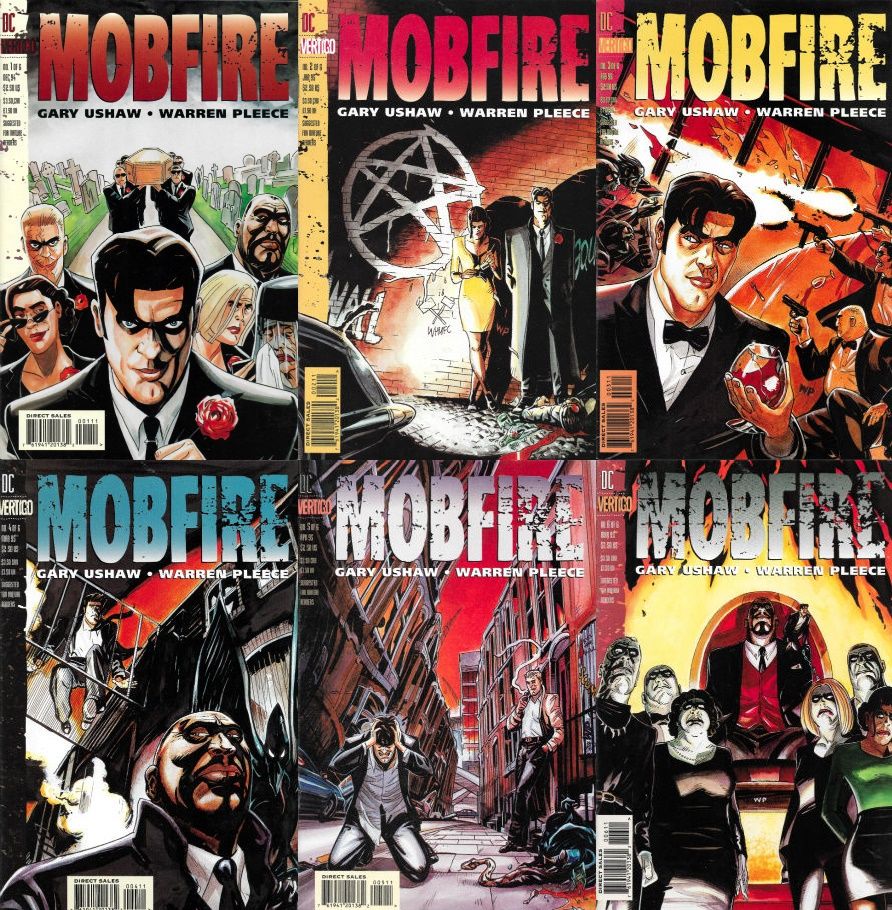“Passive Smoking On The Last Train Home.” COMICS! Sometimes It's All About Family, Innit?
/Sunday, and I've been caught a mite short. So I'll just blast through this and see how we do. It's an old Vertigo/DC Comic you might want to look out for in the dollar bins. And I'll tell you for why after the "More..."
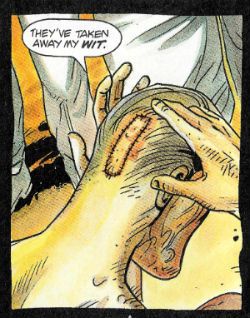 MOBFIRE by Pleece, Ushaw & Gaspar
MOBFIRE by Pleece, Ushaw & Gaspar
Anyway, this... MOBFIRE #1-6 Art by Warren Pleece Written by Gary Ushaw Lettered by Gaspar Logo and publication design by Rian Hughes Art & Text © Gary Ushaw & Warren Pleece All other material © DC Comicss DC Comics/Vertigo, $2.50 each (1994-1995)
Inheriting the family firm at short notice due to the sudden demise of a parent is always a tricky business. For Jack Kellor it's trickier than usual since the Firm his dad ran was decidedly dodgy, not entirely kosher, a bit on the illegit side, you feel me. And that's putting it kindly. See, John Kellor's business was mucky business. Crime if you must. And if you really must then come tooled up, but mind it's with something a bit tastier than a shooter, because in this slightly-to-the-side-of-reality world the scallywags have got a bit of the supernaturals on their side. See, way back when you could leave your door unlocked at night (or were stupid enough to think you could) Jack Kellor ran into a black fellow in a severe state of duress and saved his bacon. Turned out he wasn't just some bloke over here to fill in the post-war labour shortage by driving a bus. Nah, only a blooming witch doctor wanne? And thereafter indebted to the man who saved his hide (because that's how magic works, and who am I to argue?) this Bocor gave John Kellor a decided edge, at least for a bit. After all, it may well have been magic and all that, but in the wrong hands it was just a new weapon, so the other gangs picked themselves some tasty talent handy with the old hocus-pocus and there you go, Bob's your uncle and Fanny's your aunt. That's the world Jack's now chucked into, bad enough to make you wish you'd stayed in bed. But Jack's a chip off the old block in that he has ambition, but where his dad's ambition was to build it up, Jack's going to burn it down. Unless the Bocor gets a whiff of it, because he owed Jack's dear old dad, not Jack; in fact he owes Jack shit, and it looks like he's going to try his level best to make him drown in it. So, no, inheriting the family business might not be all it's cracked up to be for Jack.
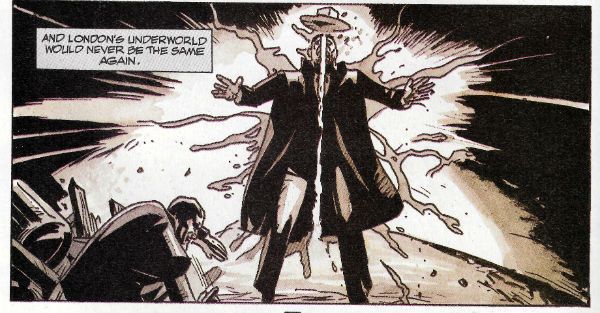 MOBFIRE by Pleece, Ushaw & Gaspar
MOBFIRE by Pleece, Ushaw & Gaspar
The six issues of MOBFIRE were published in 1994-1995 and thus far remain uncollected. This can only have been due to poor sales as pretty much everything was collected back then. If MOBFIRE did sell poorly it wasn't because of any lack of quality, but probably due to the lack of familiarity with the talent involved. I mean, I have no idea who Gary Ushaw is. I hope he's healthy and life has been kind to him, because he wrote a pretty good comic here. The first few issues of MOBFIRE are the densest and tightest, with by far the best writing which serves to suck you in quite nicely. Ushaw and Pleece then keep you on your toes with a surprising development at the fourth issue point, which then results in a lengthy guest appearance by John Constanine. As nicely written as that part is it's an odd choice for a creator owned series, and won't help the chances of a TPB now the rights have probably reverted. Shame, because for all of its six issues MOBFIRE is a pretty good time ,with a varied cast, some surprises and betrayals and it all ends in a bizarre fiasco of violence which is delightfully insane and resembles a Pampers advert directed by 1980s David Cronenberg.
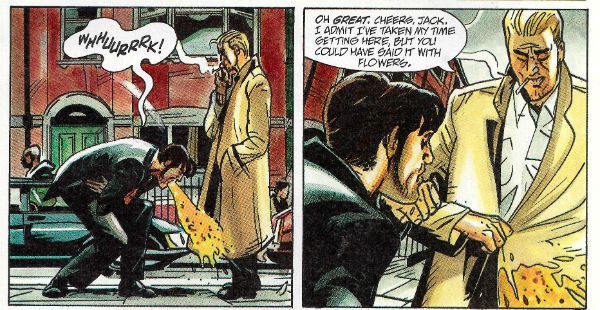 MOBFIRE by Pleece, Ushaw & Gaspar
MOBFIRE by Pleece, Ushaw & Gaspar
Whoever Ushaw is and whatever he does now, MOBFIRE shows he could write a tidy little comic. The characters are varied and nicely sketched, including but not limited to the addict sister, the mother whose bitterness is rooted in denial of the filth her life style rests on, the chipper best mate and Jack's lady friend (who is not only a woman of colour, but also clearly stronger than Jack in every way without it coming across as unctuous pandering). Ushaw's also a dab hand at that '90s Brit Talent staple the Stream Of Consciousness Babble. You know , the one Morrison and Gaiman dabbled in, Milligan excelled at, and the ridiculously neglected John Smith claimed as his own kingdom and within which he has since dwelt, seeing off all comers quite successfully. Ushaw holds his own in this tricky arena, but his effort impresses perhaps more than it should as he cleverly uses it to confound any creeping misgivings about his portrayal of the Bocor as a largely monosyllabic slab of black Evil. Dude's got depths, just pray you never see them. While the whole thing's played mainly straight Ushaw's not above a bit of playfulness. At one point the criminal enterprise is explicitly explained in terms which make you momentarily wonder whether Ushaw is in fact describing the Free Market as gangsterism. Which he is. (As they say - it's funny because it's true.) Then there’s a Scots bloke who has spooky mirror powers, and if he isn't a cheeky riff on Mirror Master then I'm Beryl Reid. (I'm not Beryl Reid). Not only that but the wee scunner ends a violently bloody encounter by recreating a visual joke made famous by Harry Worth.
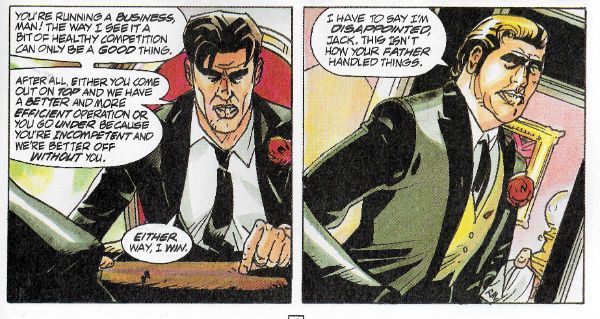 MOBFIRE by Pleece, Ushaw & Gaspar
MOBFIRE by Pleece, Ushaw & Gaspar
Don't worry if you're coming up blank there. Harry Worth is a particularly British reference point and Ushaw is pretty sweet at including these without over-egging the colloquial pudding. The singularly British references are there, but they don't run around on fire screaming in a catastrophic and self defeating bid for attention (see James Robinson's FIREARM. Or don't). E.g. at one point a couple of thick necked guards are partaking in some manly banter, and one mentions he won't be going “up The Arsenal” because “it's the big wedding on The Street.” Sure, the football reference is pretty basic, but the latter part is interesting because he's referring there to a wedding on the popular British TV soap opera Coronation Street (AKA “The Street”) rather than an actual wedding on his street. Britain not actually being that big on street weddings, since the weather is for shit and the folk are mostly miserable social inverts. Basically, for the duration of the book if you get the reference everything's better, but if you miss it there's no harm done. Best way really.
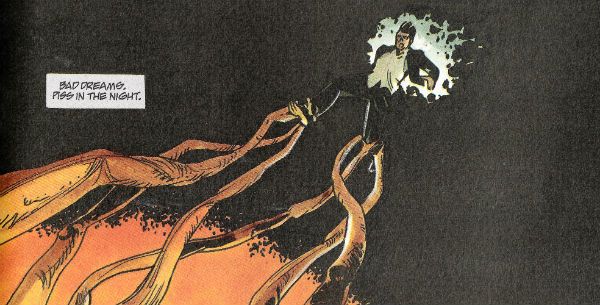 MOBFIRE by Pleece, Ushaw & Gaspar
MOBFIRE by Pleece, Ushaw & Gaspar
The uniquely British atmosphere is aided no end by the art of Warren Pleece which makes the book worthy of rediscovery all on its lonesome. Warren Pleece is a talented comic book artist, by which I mean he clearly understand the nuts and bolts of putting a page together, but more than that Warren Pleece is a singular talent, because over and above that stuff he understands the importance of conveying a sense of place. The place here is Britain and it looks like Britain. It doesn’t always, not in the comics. There's a bit more to it than Big Ben and a red bus, hard as that may be to believe. Pleece doesn't get much space to play with, but he makes the space he's given work like work is going out of fashion. In crowd scenes everyone is dressed differently, and there are a range of ages on display, but everyone has that singularly worn out and worn down lack of finish which marks every Brit out in a crowd. The shop signs proclaim “MARKS & SPENCER”, “C&A” and “WOOLWORTHS”. Yeah, Woolworths has gone now, but it used to be there; it used to be everywhere in the UK, and so Pleece's art captures not just a place but also a time. And there's also the infernal golden arches in a nod to the cultural homogenisation only just getting a toe hold back then. And Pleece packs all that in one panel on a seven panel page.
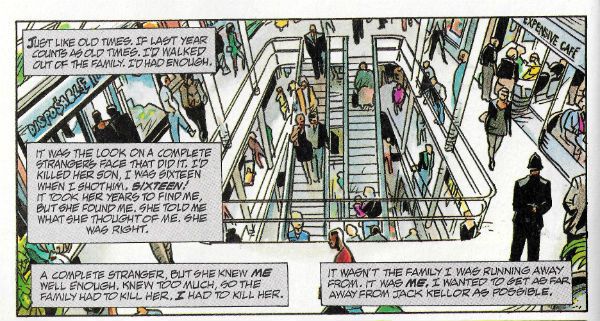 MOBFIRE by Pleece, Ushaw & Gaspar
MOBFIRE by Pleece, Ushaw & Gaspar
On another page he slides into sight the delights of typical pub grub, discreetly colouring the drinks with a typically urinous wash. Another panel on the same page shows us there’s a man in an England shirt with a tat on his neck (in every pub in England there's a man in an England shirt with a tat on his neck. Either that or he just left, or he's due in shortly. Bide your time and he'll be by, the man in the England shirt with a tat on his neck). Ella, who Jack runs with, lives in a flat and Pleece treats us to the sight of laundry flapping on the balcony and contrasts the visually tedious edifice with a short arsed but far more characterful terrace. In one panel, that is, on an eight panel page. Get the drift? Pleece's faces are distinctive with their porcelain sheen and implacable drift chinward towards Punchinello levels of grotesquery, and it's easily these that make the most marked impression. But the fact Pleece bothers to give them a fully realised world to move through lifts his work from the quirkily accomplished and into the great. Because of course it's a fully-realised world; it's our world and capturing that is a kind of magic I can believe in. Utltimatley though the book works because Ushaw and Pleece are firmly in creative cahoots, any doubts about that are kicked to the curb with the bit of business in #5 on p. 9 & 10 involving the flowers in the cafe. It does nothing to propel the plot, but does everything to assure you Ushaw and Pleece are having fun, and doing a bang up job while they are at it. Look, what I'm getting at is Ushaw's writing and Pleece's places make MOBFIRE VERY GOOD! So if you see it, tuck in!
NEXT TIME: Go on, guess! That's right – COMICS!!!


